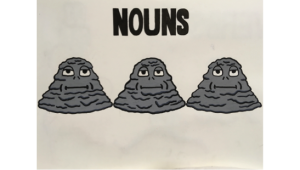Parts of speech – the pictorial way
It’s helpful for undergraduates to understand how the different parts of speech affect their writing style, and I have found an accessible and enjoyable way to teach them.
Active verbs
I start by introducing the students to active verbs. These colourful little creatures are doing something. Active verbs can help make your writing lively and colourful, and keep the sentences short. For example, ‘My friend cooked dinner.’
Passive verbs
I move on to passive verbs; these are grey, sleeping versions of the active verbs. For example, ‘Dinner was cooked by my friend.’ Continually using passive verbs can make your writing less energetic and greyer – less clear.
Nouns
After providing a few examples of active and passive verbs, I introduce nouns. Concrete nouns – ‘dog, ball, oven’ – are useful. But using lots of abstract nouns together (concepts such as freedom, goodness, belief) can clog up your writing, making it hard to understand. Nouns are represented as grey blobs.
Nominalisations
Then I come on to nominalisations – verbs or adjectives that have been turned into nouns, for example, ‘to consider’ becomes ‘consideration’. Nominalisations may sound rather grand (hence the bow ties and the top hats) but they are still nouns. Like abstract nouns, some are necessary, but using too many will clog up your writing.
Activity
I give the students an old extract by Professor Judith Butler:
The move from a structuralist account in which capital is understood to structure relations in relatively homologous ways to a view of hegemony in which power relations are subject to repetition, convergence and rearticulation…
I ask them what they think of the extract. After a moment of uncertainty, there is general agreement that the writing is unclear. (In fact, Butler no longer writes in this manner.) Now I give them picture counters to label the active and passive verbs, nouns and nominalisations.
Once they’ve finished, I provide the answers.
We discuss the piece, noting the large number of grey blobs and no active verbs. The students repeat the exercise with a short extract from George Orwell:
If a man cannot enjoy the return of spring, why should he be happy in a labour-saving Utopia? What will he do with the leisure that the machine will give him? I have always suspected that…
Students notice the rather old-fashioned emphasis on the male. Beyond that, we talk about the differences between the two extracts – the proliferation of active verbs in Orwell and absence of nominalisations. The students agree that Orwell is much clearer. With a greater understanding of the parts of speech, they can now apply the ‘blob test’ to their own writing.
7 May 2020
Related articles
Look through your essay and underline your reporting verbs. Then decide whether you have used the most suitable verb in each case.
To raise the quality of your writing, check your verbs. Select verbs that say exactly what you mean and carry the right amount of weight.
If your essay is peppered with comments such as ‘Who?’ or ‘What?’, you may have made a common grammatical error. To check, look for the pronouns.










